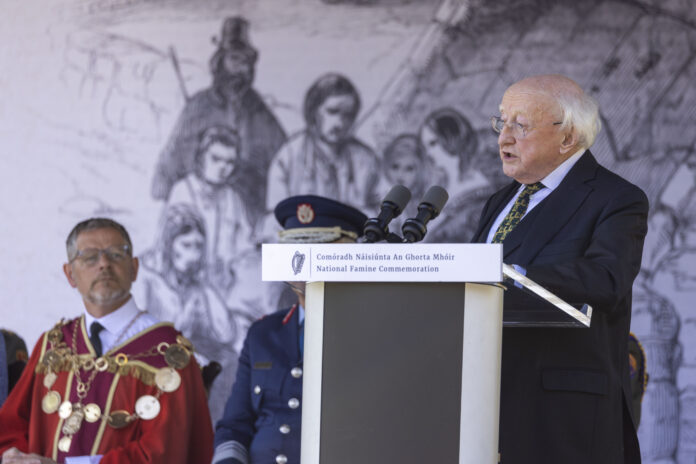
IN a moving ceremony in Kilmallock, those who died of hunger and disease during the famine were given full military honours as President of Ireland, Michael D Higgins officiated in a solemn wreath-laying ceremony.
The President was vocal on the conflict in Gaza on the occasion, saying that the people of Gaza are being subjected to “forced starvation” and hunger which is being used as “an instrument of war”.
He urged the international community to act to prevent “a massive loss of life”.
“Famine is a horrific reality in so many parts of the world, repeated again and again, accepted by too many with indifference,” President Higgins said.
“The occurrence of repeated famines, surely, is a great human failure. We are now seeing starvation being used as an instrument of war.
“No other event in our history can be likened to the Great Famine, either for its immediate, tragic impact, or its legacy of involuntary emigration, cultural loss, increased decline of the Irish language, and demoralisation.
A huge crowd gathered in the Kilmallock Fsmine Memorial Park on Saturday for a ceremony which was made possible through the co-operation of Limerick City and County Council, the Department of Arts, Culture, Communication, Sport, and Media, and the Kilmallock community.
Arts and Culture Minister Patrick O’Donovan and the Mayor John Moran were among the dignitaries who assembled for the event.
Music was provided by local musicians Liam Flanagan, Sean Ó Fearghail, and Ciara Flanagan. Pupils from Scoil Mocheallóg read the poem Threnody by Flann O’Connor.
Students from Coláiste Iósaef read a letter from Dr Morgan David O’Connell to the Kilmllock Board of Guardians from 1847.
The national commemoration was held at the Kilmallock Famine Memorial Park, located within the Kilmallock Union Workhouse complex. The park was established by the Kilmallock community on the grounds of a mass Famine grave.
Then President of Ireland Mary McAleese officially opened the park in June 1999.
A plaque at the entrance to the park carries the hopeful message: “Never again should a people starve in a world of plenty.”
Speaking at the event, Minister for Arts, Culture, Communications, Media and Sport, and Chair of the National Famine Commemoration Committee, Patrick O’Donovan noted how it was “the first time that the National Famine Commemoration has taken place in Limerick”.
“We come here today to honour and remember all those who suffered, perished, and emigrated during or because of the Great Irish Famine.
“It is very fitting that the event is being held here in the grounds of Kilmallock Workhouse and next to the graveyard where so many of our forebears who died during this time were laid to rest in a mass grave, neighbour with neighbour.”
Mayor Moran, in his welcoming address, said that “today, we remember a period in our history that changed Ireland forever, even up to this day”.
”Limerick was not spared during the Great Famine. Indeed, it was one of the counties most acutely affected by it. As we commemorate all who died during that time, we now have an opportunity to reflect on what we have achieved as a nation.”


